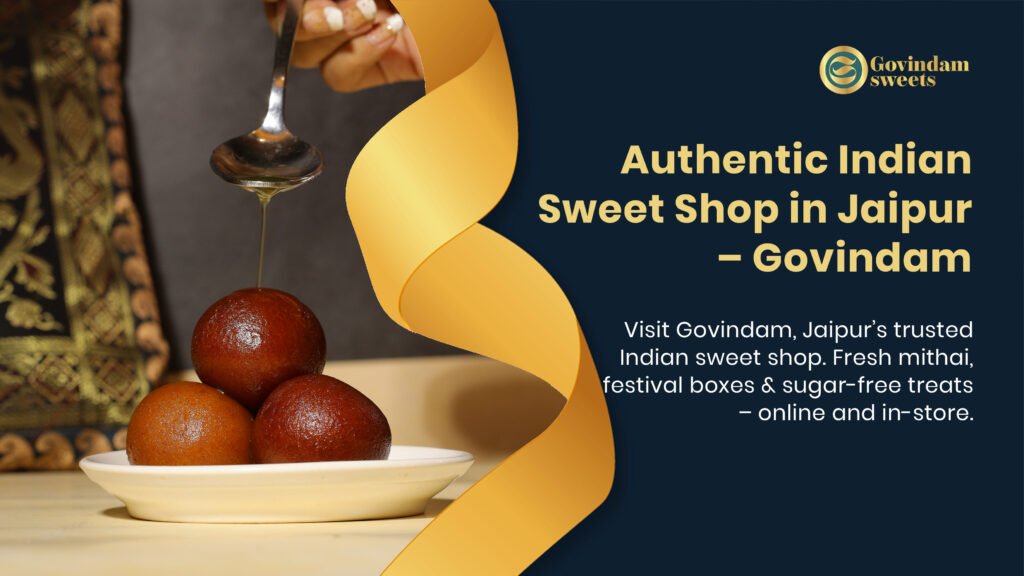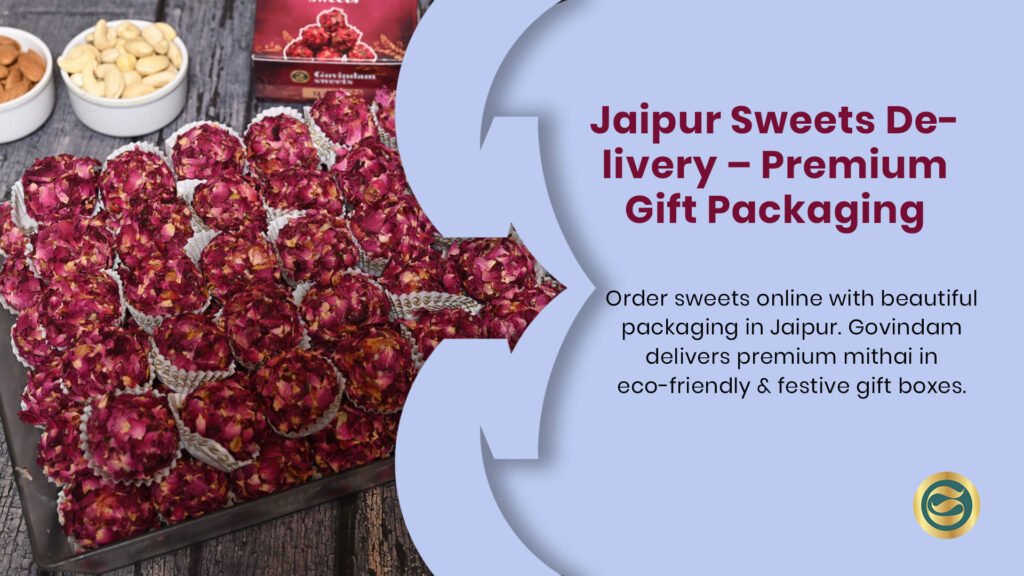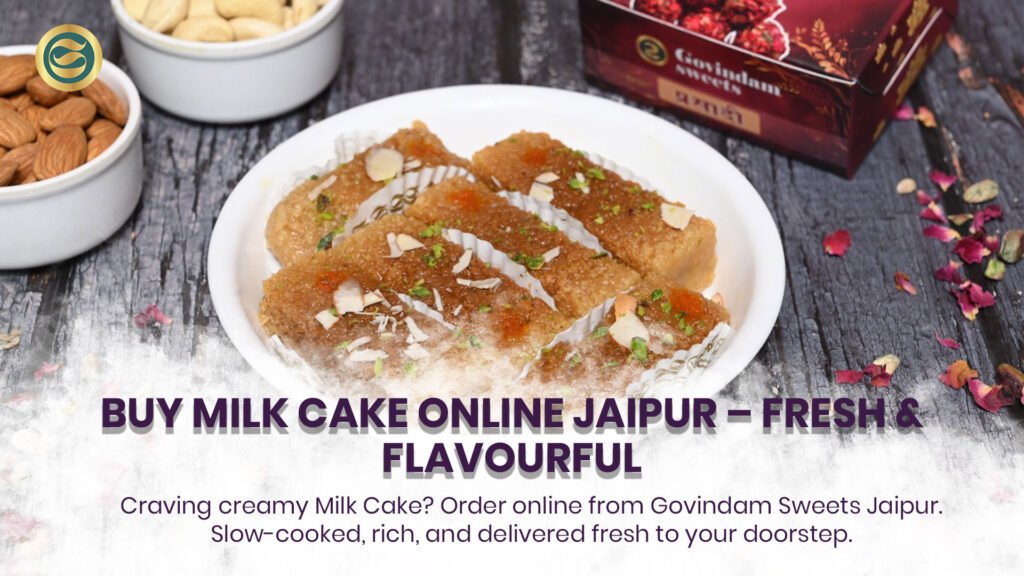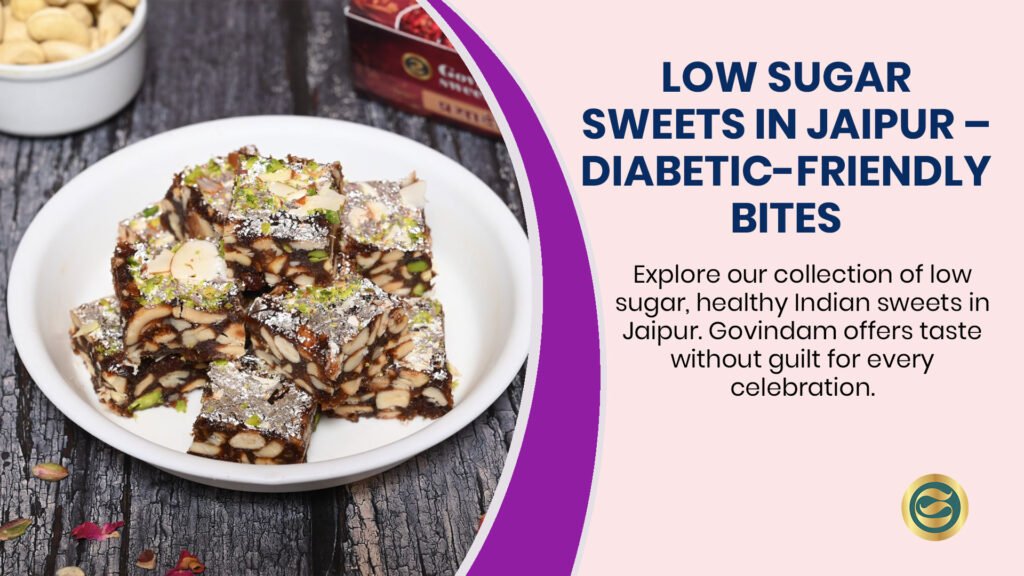Traditional Rajasthani Sweets in Jaipur – Buy Now
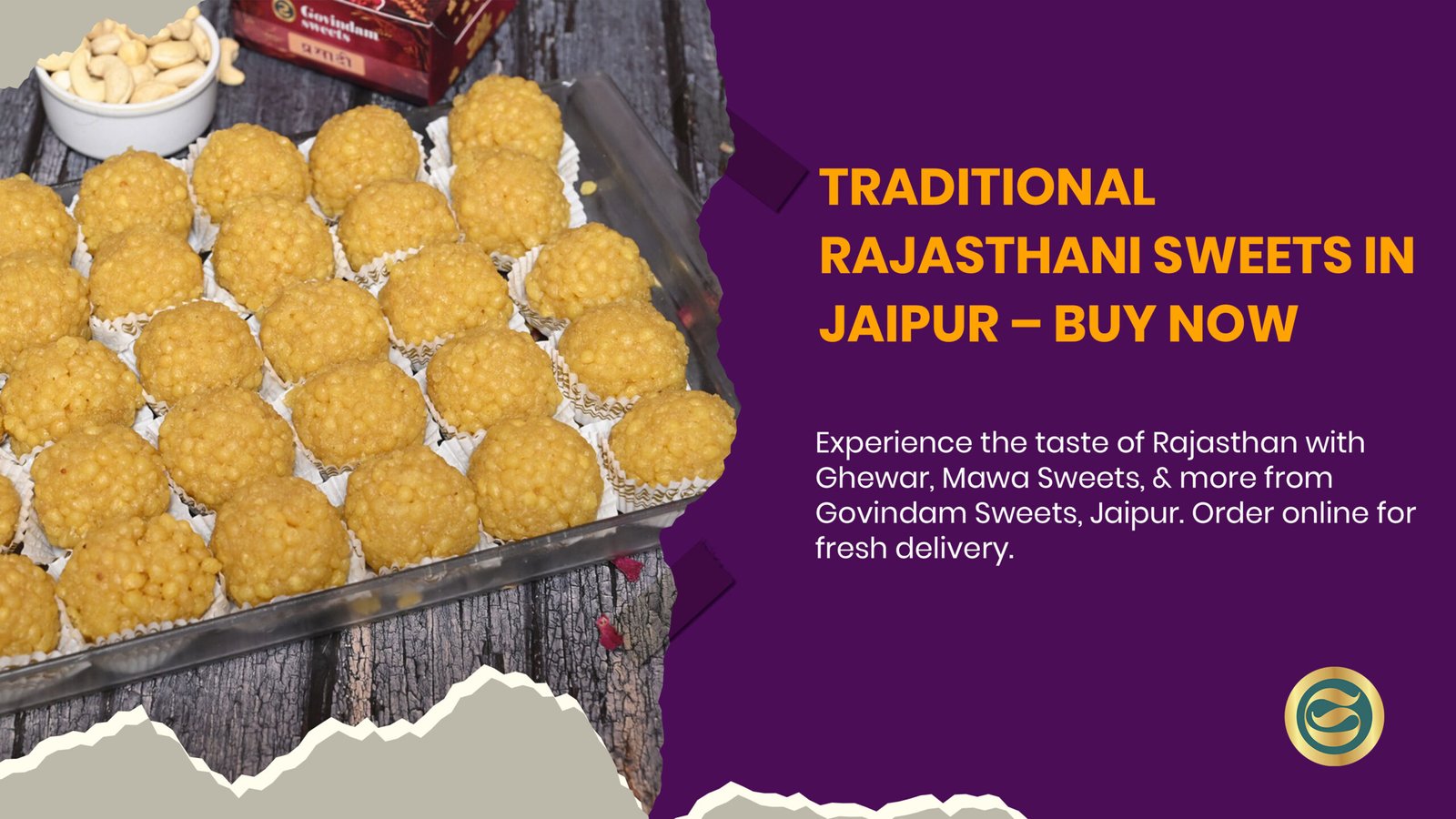
Discover authentic traditional Rajasthani sweets in Jaipur, where centuries-old recipes create unique delicacies like Ghewar, Mawa Kachori, and Balwan Laddu. These heritage treats showcase the desert state’s ingenious use of local ingredients, cooking techniques, and festive traditions. Experience these royal flavors through Govindam Sweets’ expertly crafted mithai collection.
TThe Rich Heritage of Traditional Rajasthani Sweets
Rajasthan’s culinary legacy shines brightest in its traditional sweets. These delicacies tell the story of a desert civilization that transformed limited ingredients into extraordinary creations. Traditional Rajasthani sweets from Jaipur capture this ingenuity, offering unique flavors, textures, and cultural significance unlike any other Indian region.
The royal heritage of Jaipur infuses its sweet traditions with particular refinement. Court kitchens once prepared these delicacies exclusively for maharajas and nobles. Today, establishments like Govindam Sweets preserve these royal recipes, making traditional Rajasthani sweets accessible to everyone while maintaining their authentic character and exquisite taste.
Signature Rajasthani Sweets You Must Try
Ghewar: The Crown Jewel of Rajasthani Mithai
Ghewar stands as the most iconic traditional Rajasthani sweet from Jaipur. This intricate disc-shaped delicacy features a honeycomb texture created through a labor-intensive process requiring exceptional skill. The base, made from flour and ghee batter, gets deep-fried in a special mold, then soaked in sugar syrup and topped with malai, nuts, and saffron.
Traditionally associated with the monsoon season and Teej festival, Ghewar celebrates the state’s cultural heritage. Govindam crafts multiple varieties including Plain Ghewar, Malai Ghewar, and the luxurious Rabdi Ghewar. Their meticulous preparation ensures the perfect balance of crispness and moisture that defines authentic Ghewar.
Mawa Kachori: Jaipur’s Sweet Invention
Mawa Kachori represents one of Jaipur’s most distinctive contributions to traditional Rajasthani sweets. Unlike its savory cousin, this sweet kachori features a flaky pastry shell filled with sweetened mawa (milk solids), nuts, and aromatic spices. The contrasting textures—crisp exterior and rich, creamy filling—create an unforgettable taste experience.
This unique creation requires considerable expertise to prepare correctly. The pastry must achieve the perfect thickness and flakiness while the filling needs precise sweetness and consistency. Govindam’s sweet makers excel in this technically challenging delicacy, producing what many consider the definitive version of this traditional Jaipur specialty.
Balwan Laddu: The Strength-Giving Sweet
Balwan Laddu carries both cultural significance and nutritional reputation among traditional Rajasthani sweets from Jaipur. Its name translates to “strength-giving ball,” reflecting its energy-boosting properties. Made with whole wheat flour, besan (gram flour), ghee, nuts, and traditional sweeteners, this robust sweet developed as sustenance for warriors and laborers.
Unlike softer ladoos found elsewhere in India, Balwan Laddu offers a denser texture and more complex flavor profile. The ingredients undergo careful roasting to develop nutty, caramelized notes before being shaped into substantial spheres. This traditional process preserves both authentic taste and nutritional properties.
Chogni Laddu: Luxury in Spherical Form
Chogni Laddu represents the more indulgent side of traditional Rajasthani sweets. These rich, melt-in-mouth ladoos feature generous quantities of dry fruits, particularly pistachios and almonds, blended with mawa, khoya, and high-quality ghee. Their luxurious ingredients once made them exclusive to royal tables.
Govindam maintains the authentic recipe for these premium ladoos, using the same lavish proportions of expensive nuts and aromatic spices that defined the original royal confection. The result offers a glimpse into Rajasthan’s royal culinary heritage—rich, aromatic, and subtly flavored with cardamom and saffron.
Feeni: Delicate Threaded Sweet
Feeni showcases the incredible patience and skill behind traditional Rajasthani sweets from Jaipur. This delicate creation features thin, thread-like strands of dough repeatedly stretched and folded to create a bird’s nest appearance. After deep-frying, the golden threads receive a drizzle of sugar syrup, sometimes flavored with saffron or cardamom.
The art of making perfect Feeni requires years of practice to master the stretching technique that creates the characteristic fine threads. This traditional sweet appears especially during festivals and celebrations, where its intricate appearance makes it a particularly impressive offering.
The Cultural Significance of Rajasthani Sweets
Role in Festivals and Celebrations
Traditional Rajasthani sweets play essential roles in the state’s cultural calendar. Each major festival features signature sweets that carry symbolic significance:
- Teej celebrates with Ghewar, representing the honeycomb of marital sweetness
- Diwali brings elaborate dry fruit sweets symbolizing prosperity and light
- Holi features Gujiya and colorful milk-based sweets reflecting the festival’s playful nature
- Gangaur showcases Mawa Kachori and other rich sweets honoring marital devotion
These traditional sweets transform from mere desserts into cultural artifacts carrying generations of meaning and tradition. Govindam Sweets honors these connections by preparing festival specials according to traditional timing and methods.
Wedding Traditions and Gift-Giving
Weddings in Rajasthan feature elaborate sweet-giving traditions where specific mithai carries particular significance. Traditional Rajasthani sweets communicate status, respect, and blessing through carefully selected varieties and quantities. Family sweet recipes passed through generations often make special appearances at wedding functions.
The tradition of sending sweets to the bride’s or groom’s family remains strong, with specific varieties chosen to communicate respect. Furthermore, shops specializing in traditional Rajasthani sweets in Jaipur often provide special packaging and presentation for these significant social exchanges.
The Artistry Behind Traditional Rajasthani Sweets
Ancient Cooking Techniques
The preparation of traditional Rajasthani sweets preserves cooking methods dating back centuries. Many techniques developed in response to the region’s harsh climate and limited resources:
- Slow reduction of milk to create mawa and khoya
- Careful roasting of flours to develop complex flavors
- Precise sugar syrup consistency for proper absorption and shelf life
- Specialized frying methods to create unique textures
These techniques require patience and experience rather than modern equipment. As a result, Govindam Sweets maintains these traditional methods despite their labor-intensive nature, thus ensuring authentic results that machine production cannot replicate.
Regional Ingredients That Define Authenticity
True traditional Rajasthani sweets from Jaipur use distinctive regional ingredients that provide their characteristic flavors:
- Desert-grown wheat with its distinct nutty character
- Local varieties of gram flour with higher protein content
- Indigenous dairy with higher fat content from native cattle breeds
- Regional spice blends featuring green cardamom, saffron, and fennel
- Local sweeteners including specific sugar varieties or jaggery
These regional ingredients create subtle but important differences in flavor and texture compared to similar sweets from other parts of India. Consequently, authentic sweet shops respect these ingredient traditions rather than substituting more convenient modern alternatives.
Where to Find the Best Traditional Rajasthani Sweets in Jaipur
Govindam Sweets: Preserving Heritage
Govindam Sweets stands among Jaipur’s most respected purveyors of traditional Rajasthani sweets. Undoubtedly, their commitment to authentic recipes, traditional techniques, and quality ingredients has established them as guardians of the state’s sweet-making heritage. Meanwhile, their extensive selection includes both everyday favorites and rare specialties that appear only during specific festivals.
Their multiple locations throughout Jaipur maintain consistent quality and authentic preparation methods. Typically, each sweet undergoes careful creation by trained artisans who understand the cultural significance and technical requirements of traditional recipes. As a result, this commitment to heritage comes through in the taste, appearance, and cultural authenticity of their offerings.
Historic Sweet Districts to Explore
Beyond individual shops, certain Jaipur neighborhoods maintain concentrated sweet-making traditions. Areas like Johari Bazaar and Tripolia Bazaar host clusters of sweet shops, each with their own specialties and loyal followings. Exploring these districts provides insight into the diversity of traditional Rajasthani sweets and the friendly competition that drives quality.
For visitors with limited time, guided food walks through these areas offer efficient exposure to multiple varieties of traditional sweets. However, for the most authentic experience, visit during major festivals when special seasonal varieties appear and the cultural context enhances appreciation.
Beyond Sweets: Traditional Rajasthani Savory Snacks
The Perfect Sweet and Savory Balance
Traditional Rajasthani cuisine masters the balance between sweet and savory flavors. When exploring traditional sweets, complement your experience with authentic savory snacks like Pyaz Kachori, spicy Namkeen, or fresh Samosa. These contrasting flavors create a more complete experience of Rajasthan’s culinary traditions.
In traditional Rajasthani hospitality, hosts typically offer alternating sweet and savory items to create a balanced tasting experience. This approach prevents palate fatigue from too much sweetness and showcases the diverse flavors of the region’s cuisine.
Regional Variations Worth Trying
While exploring traditional Rajasthani sweets in Jaipur, don’t miss regional specialties from other parts of the state:
- Alwar’s unique Kalakand with its grainy milk fudge texture
- Bikaner’s famous Rasgulla with its distinctive preparation method
- Jodhpur’s Makhania Lassi with sweet saffron and dry fruit toppings
- Pushkar’s special rose-flavored sweets and delicacies
These regional variations demonstrate how traditional Rajasthani sweet-making adapted to local ingredients and preferences across the state. Many quality sweet shops in Jaipur feature these regional specialties alongside local favorites.
Bringing Traditional Rajasthani Sweets to Your Doorstep
Convenient Online Ordering Options
Modern technology now makes traditional Rajasthani sweets from Jaipur accessible regardless of location. For instance, Govindam Sweets offers comprehensive online ordering with detailed product information and secure payment options. Additionally, their user-friendly platform makes it easy to browse their traditional offerings and place orders for delivery within Jaipur.
For customers outside Rajasthan, Global Shipping options make it possible to enjoy authentic sweets anywhere. Special packaging preserves freshness during transit, while temperature-controlled shipping protects delicate items like Ghewar and milk-based treats from heat damage.
Gift Packages for Special Occasions
Traditional Rajasthani sweets make meaningful gifts, and quality shops offer special packaging for this purpose. Beautiful boxes adorned with traditional Rajasthani patterns, embellishments, and motifs transform these historic treats into impressive presents suitable for important occasions.
Corporate gifting programs provide businesses with distinctive options that showcase regional culture. These traditional sweets offer a refreshing alternative to conventional business gifts, particularly during festival seasons when they carry additional cultural significance.
Preserving Sweet Traditions: Business Opportunities
The enduring popularity of traditional Rajasthani sweets creates business opportunities for entrepreneurs passionate about preserving these culinary traditions. Options like Own a Franchisee Business with established brands provide structured entry into this heritage-rich market segment.
Franchisees benefit from proven recipes and processes while contributing to the preservation of traditional sweet-making practices. As global interest in authentic regional cuisines grows, the market for genuine traditional Rajasthani sweets continues expanding beyond conventional boundaries.
Exploring Other Regional Sweets in Jaipur
Bengali Sweets’ Influence in Rajasthan
While exploring traditional Rajasthani sweets in Jaipur, notice the significant presence of Bengali Sweets that have been adopted into the local sweet culture. Items like rasgulla, sandesh, and chamcham now appear alongside native Rajasthani creations, demonstrating the cultural exchange facilitated by royal courts and migration patterns.
Many sweet shops in Jaipur, including Govindam, excel in both traditional Rajasthani and Bengali-style sweets. This dual expertise allows sweet lovers to explore different regional traditions in one location, comparing techniques, ingredients, and flavor profiles.
Fusion Creations: Tradition Meets Innovation
While traditional recipes remain sacred, some innovative sweet makers create thoughtful fusions that respect Rajasthani heritage while introducing contemporary elements. These carefully balanced creations might incorporate ingredients like chocolate, exotic fruits, or international nuts while maintaining the fundamental character of traditional preparations.
These fusion sweets appeal particularly to younger generations, introducing them to traditional flavors through familiar contemporary elements. Moreover, the best versions honor tradition rather than replacing it, thereby creating a bridge between heritage and innovation.
Frequently Asked Questions
What is the most famous traditional Rajasthani sweet from Jaipur?
Ghewar remains Jaipur’s most celebrated traditional sweet, particularly during monsoon season and the Teej festival. This disc-shaped delicacy with its honeycomb texture represents the pinnacle of Rajasthani sweet-making skill. The best versions come from established shops like Govindam Sweets that maintain traditional preparation methods rather than using shortcuts.
How long do traditional Rajasthani sweets stay fresh?
Shelf life varies significantly by sweet type. Dry sweets like certain ladoos can remain fresh for 2-3 weeks when properly stored in airtight containers. Moist sweets like milk-based items typically stay fresh for 3-5 days at room temperature or 7-10 days when refrigerated. Ghewar requires refrigeration and generally maintains quality for about a week. Without artificial preservatives, traditional sweets have shorter shelf lives than commercial versions but offer superior taste and ingredient quality.
Can traditional Rajasthani sweets be made with dietary restrictions in mind?
Yes, many traditional Rajasthani sweets can be adapted for dietary needs while maintaining authentic flavors. Quality shops can prepare reduced sugar versions, dairy-free adaptations of selected items, and gluten-free options upon request. Advance ordering is usually required for these specialized preparations. Always communicate specific dietary requirements clearly when ordering.
What’s the best way to serve traditional Rajasthani sweets?
For authentic presentation, serve traditional sweets at room temperature on silver or brass plates. Many milk-based sweets benefit from slight chilling but should warm slightly before serving to fully release their flavors and achieve optimal texture. Accompany sweets with masala chai for a traditional pairing, or serve alongside plain milk for children. For formal occasions, include contrasting varieties offering different textures and flavor profiles.
Are traditional Rajasthani sweets suitable for international shipping?
Selected traditional sweets travel well internationally when properly packaged. Dry sweets like certain ladoos, Sohan Papdi, and Boondi maintain quality during shipping. More delicate items like Ghewar require specialized packaging and expedited shipping. Services like Global Shipping from established shops ensure proper handling for international delivery. Customs regulations for food items vary by country, so verify requirements for your destination before ordering.
Conclusion: Experiencing Rajasthan’s Sweet Heritage
Traditional Rajasthani sweets from Jaipur offer more than mere indulgence—they provide a taste of history, culture, and culinary artistry refined over centuries. In fact, each sweet carries stories of royal patronage, desert adaptation, festive celebration, and community identity expressed through ingredients and techniques.
When you enjoy authentic traditional sweets from quality establishments like Govindam Sweets, you participate in the preservation of culinary heritage. Importantly, these time-honored recipes and methods face challenges from mass production and changing tastes, therefore making your appreciation a meaningful contribution to cultural continuity.
Whether you visit Jaipur and explore its sweet shops in person or order these delicacies online, take time to understand the traditions behind each sweet. This knowledge enhances both the flavor experience and your connection to Rajasthan’s remarkable cultural heritage—a legacy made deliciously tangible through its extraordinary traditional sweets.





